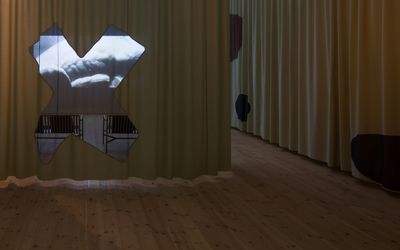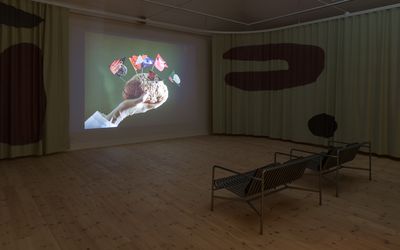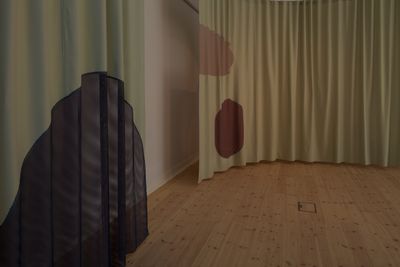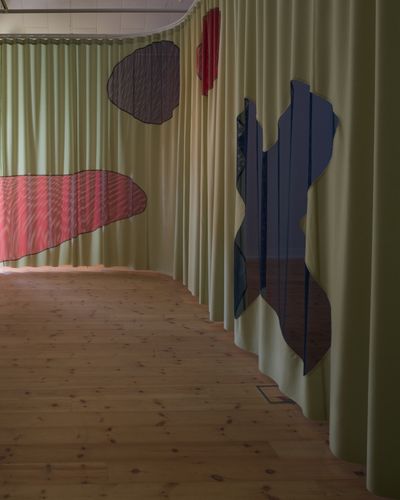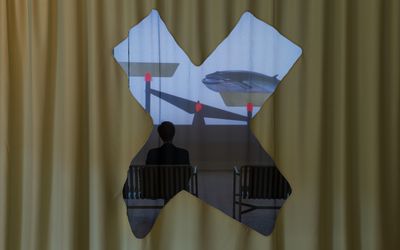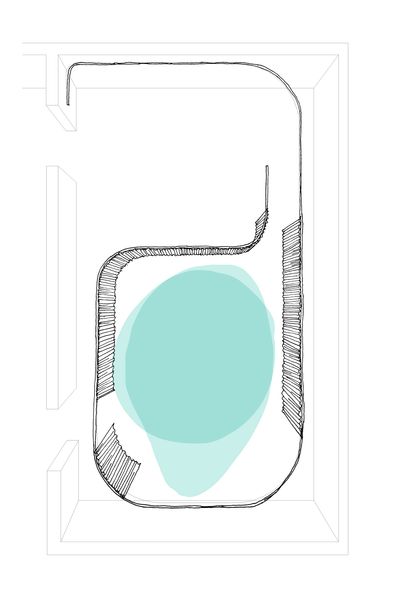Céline Condorelli Vært / Host
–
–
In January 2020, Céline Condorelli’s large-scale curtain installation, Host, returns to Kunsthal Aarhus’ Gallery 1. Both an artwork and an exhibition architecture, the installation hosts a film programme about migration and climate change, curated by Condorelli, as well as a number of Kunsthal Aarhus’ exhibitions and events.
The title of the installation names what it does – it hosts. This function usually belongs to the art institution as the host of artists, artworks and audiences. Condorelli’s installation changes the existing institutional and spatial conditions by presenting itself as a host, while also being a guest (or even a parasite) both in the space and the exhibition programme.
Conventionally a presentation device, Condorelli’s curtain is both part of the display and on display. More than 30 meters long, it consists of four sections that enable various configurations, with semi-transparent windows allowing views across the space and into exhibitions or events taking place. In this way, the installation creates openings and boundaries that structure the experience of the space.
The installation hosts a film programme in seven parts – Abstractions, Land, Water, Enclosures, Distance, Sea and Seed – which combine documentaries, artists’ films and feature-length films dealing in some way with the consequences of living in a dangerously warmer world for people, animals and landscape. The films offer past and present-day observations of traditional and industrial food production, global capitalism’s philosophy of extraction, the consequences of waste and exploitation, and portraits of migrations all over the world. Avoiding catastrophic, apocalyptic discourses by instead offering poetic and compelling readings of our times, these unique and rarely seen films appeal to individual and collective transformation for a more compassionate world.
The film programme includes films by Ursula Biemann; Wang Bing; Lucien Castaing-Taylor & Véréna Paravel; Vittorio De Seta; Lav Diaz; Jorge Furtado; Inhabitants with Margarida Mendes; Karrabing Film Collective; Colectivo Los Ingrávidos; Sakis Maniatis & Yorgos Tsemberopoulos; Jumana Manna; Angela Melitopoulos & Angela Anderson; Peter Nadin, Natsuko Uchino & Aimée Toledano; Arjuna Neuman & Denise Ferreira da Silva; Artavazd Pelechian; Ben Rivers; Allan Sekula and Noël Burch; Cauleen Smith; Ana Vaz & Tristan Bera; and Saskia Olde Wolbers.
Condorelli (b. 1974, lives and works in London and Lisbon) is interested in how human action takes place amidst countless structures of support mostly taken for granted, and therefore appearing to be invisible. By altering existing conditions – like those at Kunsthal Aarhus – her artworks make these support structures visible and invite us to reengage with them.
A previous iteration of this project took place in the garden of the Agricultural University of Athens as the outdoor Cinema Zagara, commissioned by Locus Athens for Geometries, and produced with AREA architects in 2018. It hosted the film programme Ecodrome, co-programmed with Filipa Ramos, which has been expanded for Kunsthal Aarhus.
Host was executed by Kiem Ai Vien, Carl Frischknecht, Jette Gejl, Louise Haugaard Nielsen, Henning Kjeldsen, Muhamad Oso, Jaris Poulsen, Malou Steen, Tuoi Thi Ngyuen, Kim André Thomsen and Kim Vu.
Host is curated by Trine Friis Sørensen, who is a postdoc fellow at Kunsthal Aarhus and Aarhus University, supported by New Carlsberg Foundation.
Host was on view in Kunsthal Aarhus’ Gallery 1 between April 26 and September 22, 2019, during which time it hosted the film programme on migration and climate change, part of the exhibition Leviathan curated by Piscine as well as a number of Kunsthal Aarhus’ events including the talk series How We Curate.
Biography
Céline Condorelli lives and works between London and Lisbon and has exhibited internationally including at IMA Brisbane, Australia; Gwangju Biennale; Liverpool Biennial; Sydney Biennial; Kunsthalle Lissabon; HangarBicocca, Milan; Chisenhale Gallery, London; Van Abbemuseum, Eindhoven; and SALT, Istanbul; amongst others. She is one of the founding directors of Eastside Projects, Birmingham, and the author and editor of Support Structures (Sternberg Press, 2009).
"Condorelli reappropriates Le Corbusier’s visual vocabulary as an act of transformation — a critique of the once-revered power of human beings to control and reshape the environment — and uses it to frame a set of positions that question our ability to live on this planet without destroying the system that sustains us."
Flash Art, Silvia Sgualdini, 13.06.2019
Supported by
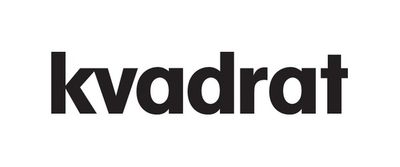






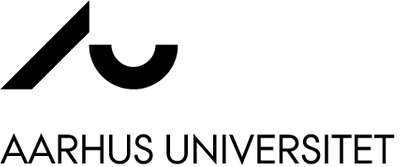
The Research Programme Contemporary Aesthetics and Technology at Aarhus University.
